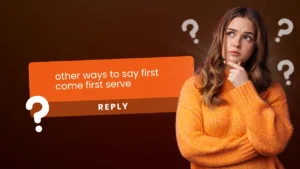Have you ever found yourself typing Did you know over and over, wishing you had a fresher, more engaging way to share interesting facts or information? You’re not alone! Whether you’re writing an email, chatting with friends, or presenting at work, using the same phrase repeatedly can feel stale.
But here’s the good news: your search ends here! This article is packed with over 120 creative alternatives to Did you know, tailored for formal, informal, idiomatic, and professional situations. No matter the context, you’ll find the perfect phrase to make your message stand out. Let’s dive in!
1. Formal Ways to Say Did You Know
When you’re in a formal setting—like writing a report, giving a presentation, or crafting a professional email—you need polished and sophisticated alternatives. Here are 30+ formal ways to say Did you know:
- Were you aware that
- Are you familiar with the fact that
- It may interest you to know that
- Have you been informed that
- Is it known to you that
- You might find it noteworthy that
- It’s worth noting that
- It’s important to recognize that
- You may not be aware that
- It’s a little-known fact that
- It’s worth mentioning that
- It’s interesting to observe that
- It’s relevant to point out that
- It’s worth highlighting that
- It’s significant to note that
- It’s essential to understand that
- It’s crucial to acknowledge that
- It’s pertinent to mention that
- It’s fascinating to consider that
- It’s enlightening to discover that
- It’s compelling to note that
- It’s valuable to recognize that
- It’s insightful to observe that
- It’s remarkable to consider that
- It’s noteworthy to mention that
- It’s intriguing to learn that
- It’s beneficial to be aware that
- It’s advantageous to know that
- It’s constructive to understand that
- It’s informative to note that
2. Informal Ways to Say Did You Know
For casual conversations with friends, family, or social media, you want something light and relatable. Here are 30+ informal alternatives to Did you know:
- Guess what
- Fun fact
- Bet you didn’t know
- Here’s a cool thing
- You’ll never believe this
- Check this out
- Here’s something interesting
- Wait till you hear this
- This might surprise you
- Here’s a little tidbit
- You know what’s crazy
- Here’s a wild fact
- This blew my mind
- Here’s a quick heads-up
- You’re not gonna believe this
- Here’s a neat little fact
- This is kinda cool
- Here’s a fun little nugget
- You might not know this
- Here’s a quick fun fact
- This is pretty wild
- Here’s something you might like
- This is kinda mind-blowing
- Here’s a quick little factoid
- This is super interesting
- Here’s a cool little tidbit
- This is kinda awesome
- Here’s a quick little nugget
- This is pretty fascinating
- Here’s a fun little piece of info
3. Idiomatic Ways to Say Did You Know
Idiomatic expressions add flair and personality to your language. Here are 30+ idiomatic alternatives to Did you know:
- Here’s a little-known gem
- This might knock your socks off
- Here’s a nugget of wisdom
- This is a real eye-opener
- Here’s a juicy tidbit
- This is food for thought
- Here’s a golden nugget
- This is a hidden gem
- Here’s a little secret
- This is a game-changer
- Here’s a mind-boggler
- This is a curveball
- Here’s a little treasure
- This is a real shocker
- Here’s a fascinating tidbit
- This is a head-turner
- Here’s a little bombshell
- This is a jaw-dropper
- Here’s a little sparkler
- This is a real stunner
- Here’s a little dazzler
- This is a real showstopper
- Here’s a little marvel
- This is a real eye-catcher
- Here’s a little wonder
- This is a real attention-grabber
- Here’s a little dazzler
- This is a real conversation-starter
- Here’s a little showpiece
- This is a real crowd-pleaser
4. Professional Ways to Say Did You Know
In the workplace, clarity and professionalism are key. Here are 30+ professional alternatives to Did you know:
- It’s worth noting for your awareness that
- You may find it relevant that
- For your consideration
- It’s important to highlight that
- It’s worth bringing to your attention that
- You might find it beneficial to know that
- It’s critical to note that
- It’s worth emphasizing that
- It’s essential to be aware that
- It’s valuable to understand that
- It’s pertinent to highlight that
- It’s constructive to note that
- It’s insightful to recognize that
- It’s advantageous to be informed that
- It’s significant to acknowledge that
- It’s relevant to point out that
- It’s worth mentioning for your reference that
- It’s important to bring to your attention that
- It’s crucial to understand that
- It’s beneficial to be mindful that
- It’s worth considering that
- It’s informative to highlight that
- It’s noteworthy to mention that
- It’s enlightening to recognize that
- It’s compelling to note that
- It’s valuable to be aware that
- It’s constructive to understand that
- It’s insightful to observe that
- It’s advantageous to note that
- It’s significant to recognize that
Conclusion
Using the right phrase to replace Did you know can make your communication more engaging, professional, or fun, depending on the situation. Whether you’re writing an email, chatting with friends, or presenting at work, these 120+ alternatives give you the perfect tool for every context.
So, why stick to the same old phrase? Mix it up, experiment, and watch your conversations come alive! Practice using these alternatives, and soon, they’ll become second nature. Happy communicating!



